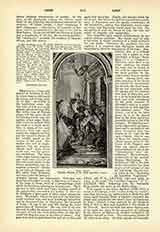

Lucera, Diocese of (LUCERINENSIS). Lucera is a very ancient city in the province of Foggia in Apulia, Southern Italy. It originally belonged to Daunia. In 320 B.C. it was taken by the Romans, a Roman colony being established there in 314. The Samnites defeated the Romans near Lucera in 294. During the war between Caesar and Pompey it was an important point of defense for the fatter. In A.D. 663 it was captured from the Lombards and destroyed by Constantius II. Lucera attained great importance when Frederick II transferred thither the Saracens of Sicily whom he had shortly before subjugated, and who from enemies became his most faithful and trusted supporters in his wars against the popes and the great barons of the Kingdom of Naples. The royal treasury was also located at Lucera. During the invasion of Charles of Anjou Lucera made the longest resistance. The remaining Saracens were converted en masse in 1300; their mosque was destroyed by Charles II, and upon its ruins arose the present cathedral, S. Maria della Vittoria. Local tradition traces the origin of the episcopal see to the third century (St. Bassus). The first historically certain bishop is Marcus (c. 743). Among other noteworthy bishops were Nicolo, papal legate at Constantinople in 1261; the Dominican Agostino Gasotti (1318), formerly Archbishop of Zagabria; Tommaso de Acerno (1378), author of “De creatione Urbani VI opusculum”; Scipione Bozzuti (1582), killed in a sack of the city by some exiles in 1591. In 1391 the Diocese of Lucera was increased by the addition of that of Farentino, or Castelfiorentino, a city founded in 1015 by the Byzantine catapan, Basileios. It was the place of Frederick II‘s death. After 1409 the See of Tortiboli (Tortibulum) created before 1236, was united to Lucera. Finally in 1818, the united Diocese of Montecorvino and Vulturaria were added to Lucera. Montecorvino became an episcopal see in the tenth century, and among its bishops was St. Albert (d. April 5, 1037). Its union with Vulturaria, a town now almost deserted, took place in 1433. Noteworthy among the later bishops was Alessandro Gerardini d’Amelia (1496), a Latin poet, author of many historical, educational, and moral works, and one of the chief supporters of the expedition of Columbus; in 1515 he was transferred to San Domingo in America, where he died in 1521. The Diocese of Lucera has 17 parishes with 75,000 souls; 4 religious houses of men and 6 of women; 1 school for boys and 3 for girls. In March, 1908, the Diocese of Troia was united with Lucera. It was established in the eleventh century, and has 9 parishes with 26,200 souls, one Franciscan convent, and three houses of monks.
U. BENIGNI

